A Shepherd after His own Heart

The photo above is a beautiful image of this bishop's love for his people and I think something of his simplicity and humility is also apparent in the photo above and the photos that follow. Having met him quite a number of times in my year in his diocese, I regard him as a fine example of the bishop as pastor and teacher of the flock entrusted to him by the Lord. Why do I single him out? Partially because he has touched me by his integrity and example as no other bishop has and the photo above by Fr Allan served to remind me of his qualities. But also because I would like to take this opportunity to highlight key parts of Pope John Paul II's reflection and teaching on the ministry of the bishop.
All too often bishops, and by extension priests, are lured into becoming men of administration when their chief duty is the care of souls. For some, parochial administration is an all too welcome temptation, for many, it is a burden of office and a Cross to be borne. The goal of the bishop is to be Father and Shepherd of the flock, in the image and pale imitation of He who is Father and Shepherd of all. As Shepherd, he knows his sheep and their needs, he seeks them out and cares for them with a paternal love. Thus, the late Holy Father wrote in the apostolic exhortation, Pastores Gregis (henceforth 'PG'):
"Hope in Jesus the Good Shepherd will fill his heart with compassion, prompting him to draw near to the pain of every suffering man and woman and to soothe their wounds, ever confident that every lost sheep will be found. The Bishop will thus be an ever more luminous sign of Christ, the Shepherd and Spouse of the Church. Acting as father, brother and friend to all, he will stand beside everyone as the living image of Christ, our hope, in whom all God's promises are fulfilled and all the expectations of creation are brought to completion."
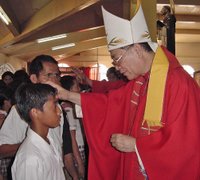 The call for the bishop to be "father, brother and friend to all" is particularly attractive, as we move away from the image of the bishop as prince, politician and CEO! Like Christ, he goes among the people and is there for them, listening, consoling and strengthening them in faith, hope and love. Thus: "the three functions of teaching, sanctifying and governing the People of God are to be carried out in imitation of the Good Shepherd: with charity, knowledge of the flock, concern for all, mercy towards the poor, the stranger and those in need, and a willingness to seek out the lost sheep and to bring them back to the one sheepfold" (PG 7).
The call for the bishop to be "father, brother and friend to all" is particularly attractive, as we move away from the image of the bishop as prince, politician and CEO! Like Christ, he goes among the people and is there for them, listening, consoling and strengthening them in faith, hope and love. Thus: "the three functions of teaching, sanctifying and governing the People of God are to be carried out in imitation of the Good Shepherd: with charity, knowledge of the flock, concern for all, mercy towards the poor, the stranger and those in need, and a willingness to seek out the lost sheep and to bring them back to the one sheepfold" (PG 7).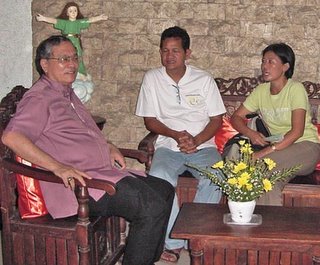
There should not be a bevy of secretaries or a complicated and bureaucratic Curia that innure him from the needs of the flock; nor should there be myriads of costly and inefficient committees that entangle him in ivory-towered meetings, far from the cries of his flock. Hence, "the exercise of authority in the Church cannot be understood as something impersonal or bureaucratic, precisely because it is an authority born of witness. All that the Bishop says and does must reveal the authority of Christ's word and his way of acting. Without the authoritativeness of his lived holiness – his personal witness of faith, hope and love – only with difficulty could a Bishop's governance be accepted by the People of God as a manifestation of the active presence of Christ in his Church" (PG 43). Rather, "as pastors and true fathers, assisted by the priests and other helpers, [they] have the task of gathering together the family of the faithful and in it fostering charity and brotherly communion" (PG 5).
All this is made possible by the bishop's spiritual life in close communion with the Good Shepherd and in the heart of the Trinity. Hence, Pope John Paul II says: "A Bishop can be considered a genuine minister of communion and hope for God's holy people only when he walks in the presence of the Lord. It is not possible to be a servant of others unless one is first a ''servant of God''. And one can only be a servant of God if one is a 'man of God'... Radiant with the light of the Trinity, he will be a sign of the merciful goodness of the Father, a living image of the love of the Son, and transparently a man of the Spirit, consecrated and sent forth to lead the People of God along the paths of history on their pilgrimage to eternity" (PG 13, 12).
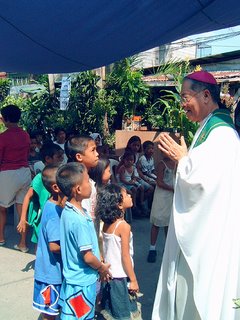
Bishop Deo's context is to be the pastor of one of the poorest dioceses in the Philippines, with a very challenging justice and peace dimension, in one of Asia's poorest nations. As such, he responds with dignity and humble poverty to these words of the late Holy Father: "Consequently, the Bishop who wishes to be an authentic witness and minister of the Gospel of hope must be a vir pauper. This is demanded by the witness he is called to bear to Christ, who was himself poor. It is also demanded by the Church's concern for the poor, who must be the object of a preferential option. The Bishop's decision to carry out his ministry in poverty contributes decisively to making the Church the 'home of the poor'" (LG 20) and "he likewise proclaims the Church's social teaching, based on the Gospel, and he shows profound concern for the defence of all who are poor, raising his voice on behalf of the voiceless in order to defend their rights" (PG 67).
Indeed, service of the poor is at the heart of his diocese's mission, in a place where these words are all too true: "The poor are legion! Within an unjust economic system marked by significant structural inequities, the situation of the marginalized is daily becoming worse. Today, in many parts of the world, people are starving, while in other places there is opulence. It is above all the poor, the young and refugees who are the victims of these dramatic cases of inequality" (ibid).
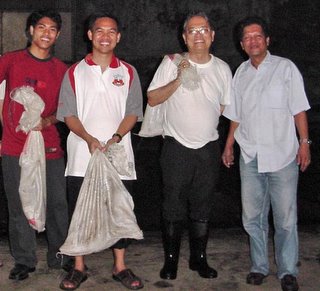
In a land where the faithful show great deference to their elders and especially to the clergy, this bishop is disarmingly simple, good-humoured and humble. I shall not forget the occasion he expressed a desire to visit the fishing port of Dagat-dagatan, and removing his episcopal regalia (except his bishop's ring which is a sign of his marriage to the diocese), he donned the rubber boots of a fisherman and a simple white shirt and set out to meet the poor fishermen of his diocese, walking amidst the filth and hubbub of the fish market. Here was the Fisher of Men among the fishermen and he blended into the crowds with ease; the bishop among his people, talking to them, listening and asking questions. It was a sight that warmed my heart and endeared him to me.

As bishop he is approachable and amiable and always has time for his people. I recall the one time I took some children from my religion class to the cathedral for a diocesan Liturgy and afterwards he patiently talked to the children and answered their questions, giving them an informal catechesis on the Church and the diocese. They were clearly enthralled and came away from the experience with a greater love for their bishop and the local Church. In addition, I have seen him socially at various events and noticed his affability and warmth.
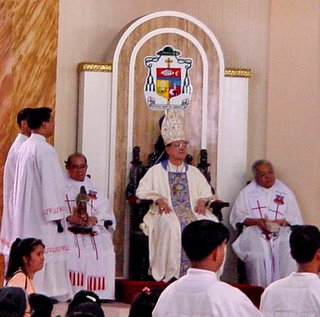 In a sense, this post is a tribute to Bishop Deogracias because he is, in my mind, a true servant of the Church, a Shepherd and Father in God.
In a sense, this post is a tribute to Bishop Deogracias because he is, in my mind, a true servant of the Church, a Shepherd and Father in God.But it is also a tribute to the many other bishops who serve God's Holy People in a similar manner and the many who strive to live up to their tremendous Calling. As with any public servant or leader, it is all too easy for one to criticize and attack them, but surely Christian charity demands that we support one another in prayer... As such, I thank God who has Called "the Bishop [to] stand in the midst of the Church as a vigilant sentinel, a courageous prophet, a credible witness and a faithful servant of Christ..." (PG 3).
May the eternal Shepherd bless our bishops, uniting them more closely to Himself, may Blessed Mary be their Mother at all times and may all the sainted bishops of the Church uphold them in prayer and by their shining example.
Amen.
 Above: My final Mass in the parish (April 2005) when Bishop Deo' presented me with a small gift on behalf of the parish. I felt the fact that he wanted to come and say Mass for us on that occasion was a mark of his love for the parish and his appreciation for the service rendered to them by the Dominican Family.
Above: My final Mass in the parish (April 2005) when Bishop Deo' presented me with a small gift on behalf of the parish. I felt the fact that he wanted to come and say Mass for us on that occasion was a mark of his love for the parish and his appreciation for the service rendered to them by the Dominican Family.







0 Comments:
Post a Comment
<< Home